高三英语 时态和语态
高考英语动词的时态和语态
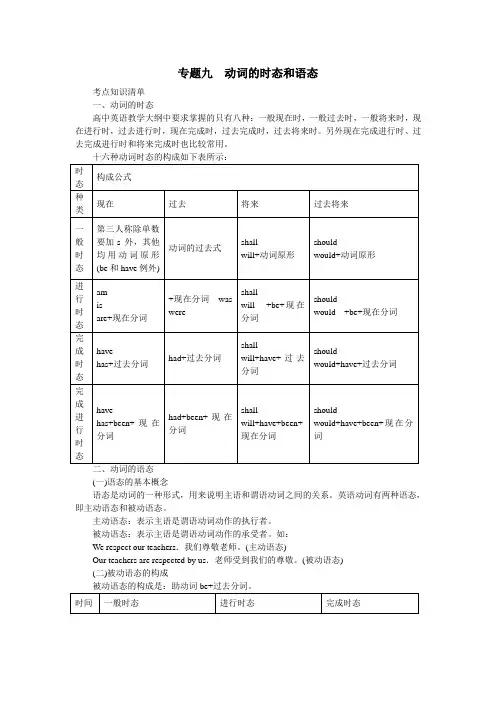
专题九动词的时态和语态考点知识清单一、动词的时态高中英语教学大纲中要求掌握的只有八种:一般现在时,一般过去时,一般将来时,现在进行时,过去进行时,现在完成时,过去完成时,过去将来时。
另外现在完成进行时、过去完成进行时和将来完成时也比较常用。
二、动词的语态(一)语态的基本概念语态是动词的一种形式,用来说明主语和谓语动词之间的关系。
英语动词有两种语态,即主动语态和被动语态。
主动语态:表示主语是谓语动词动作的执行者。
被动语态:表示主语是谓语动词动作的承受者。
如:We respect our teachers.我们尊敬老师。
(主动语态)Our teachers are respected by us.老师受到我们的尊敬。
(被动语态)(二)被动语态的构成知识梳理考点一一般现在时1.表示经常发生的习惯性的、现在反复出现的动作或状态,这类句子常用的时间状语有:always(总是),usually(通常),seldom(很少),often(经常),sometimes(有时),every day(每天),now and then(时常),once a week(一周一次)等。
如:I usually go to bed at nine.我通常9点钟睡觉。
He writes to his parents once a month.他每月给父母写一封信。
2.表示眼下或目前等现在时间所发生的动作或存在的状态,这种状态带有一定的持续性。
如:They are very busy.他们很忙。
What’s the matter with you?你怎么了?3.表示客观事实或普遍真理。
如:China is in the east of Asia.中国位于亚洲东部。
Light travels faster than sound.光比声音传得快。
4.书报的标题,故事的叙述,小说、戏剧、电影等情节介绍,图片的说明等。
如:The story takes place on an island during the second Revolution Civil War.这个故事发生在第二次国内革命战争时期的一个海岛上。
完整版高考英语动词时态和语态讲解
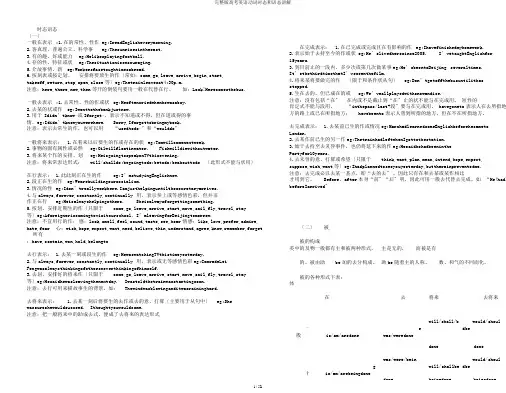
时态语态〔一〕一般在表示:1.在的常性、性作 eg:IreadEnglisheverymorning.2.客真理、普遍公立、科学事eg:Thesunrisesintheeast.3.有的趣、好或能力eg:Helikesplayingfootball.4.存的性、特征或状eg:Thesituationisencouraging.5.介故事情、新eg:Workersfacetoughtimesabroad.6.按刻表或按定划、安排将要放生的作〔常如:come,go,leave,arrive,begin,start,takeoff,return,stop,open,close等〕eg:Thetrainleavesat4:30p.m.注意:here,there,now,then等开的倒装句要用一般在代替在行。
如:Look!Herecomesthebus.一般去表示:1.去常性、性的作或状eg:Heoftencriedwhenhewasaboy.2.去某的状或作eg:Iwenttothebankjustnow.3.用于Ididn’tknow⋯或Iforgot⋯,表示不知道或不得,但在道或得的事情。
eg:Ididn’tknowyouwerehere.Sorry,Iforgottobringmybook.注意:表示去常生的作,也可以用“usedtodo⋯〞和“woulddo〞一般将来表示: 1.在看来以后要生的作或存在的状eg:Tomwillcomenextweek.2.事物的固有属性或必然eg:Oilwillfloatinwater. Fishwilldiewithoutwater.3.将来某个作的安排、划eg:HeisgoingtospeakonTVthisevening.注意:将来常表达形式:will/shalldo;begoingtodo;betodo;beabouttodo 〔此形式不能与状用〕在行表示: 1.此此刻正在生的作eg:I’mstudyingEnglishnow.2.段正在生的作eg:Wearebuildingoursocialism.3.情况的性eg:Idon’treallyworkhere.Iamjusthelpinguntilthesecretaryarrives.4.与always,forever,constantly,continually 用,表示参上或等感情色彩,但并非作正在行eg:Heisalwayshelpingothers. Sheisalwaysforgettingsomething.5.按划、安排近期生的作〔只限于come,go,leave,arrive,start,move,sail,fly,travel,stay等〕eg:Aforeigneriscomingtovisitourschool. I’mleavingforBeijingtomorrow.注意:不宜用行的作:感:look,smell,feel,sound,taste,see,hear情感:like,love,prefer,admire, hate,fear 心:wish,hope,expect,want,need,believe,thin,understand,agree,know,remember,forget 所有:have,contain,won,hold,belongto去行表示: 1.去某一刻或段生的作eg:HewaswatchingTVthistimeyesterday.2.与always,forever,constantly,continually 用,表示或无等感情色彩eg:ComradeLei Fengwasalwaysthinkingofothersneverthinkingofhimself.3.去划、安排好的将来作〔只限于come,go,leave,arrive,start,move,sail,fly,travel,stay等〕eg:Hesaidhewasleavingthenextday. Iwastoldthetrainwasstartingsoon.注意:去行可用来描故事生的背景,如:Thewindwasblowinganditwasraininghard.去将来表示: 1.去某一刻后将要生的去作或去的意、打算〔主要用于从句中〕eg:She wassureshewouldsucceed. Ithoughtyouwouldcome.注意:把一般将来中的助成去式,便成了去将来的表达形式在完成表示: 1.在已完成或完成且在有影响的作eg:Ihavefinishedmyhomework.2.表示始于去持至今的作或状eg:He’slivedher esince2005. I’vetaughtEnglishfor15years.3.到目前止的一段内,多少次或第几次做某事eg:He’sbeentoBeijing severaltimes.It’sthethirdtimethatI’veseenthefilm.4.将来某将要做完的作〔限于和条件状从句〕eg:Don’tgetoffthebusuntilithas stopped.5.生在去的,但已成在的或eg:We’veallplayedwithsnowandice.注意:没有包括“在〞在内或不是截止到“在〞止的状不能与在完成用。
高中英语时态语态总结
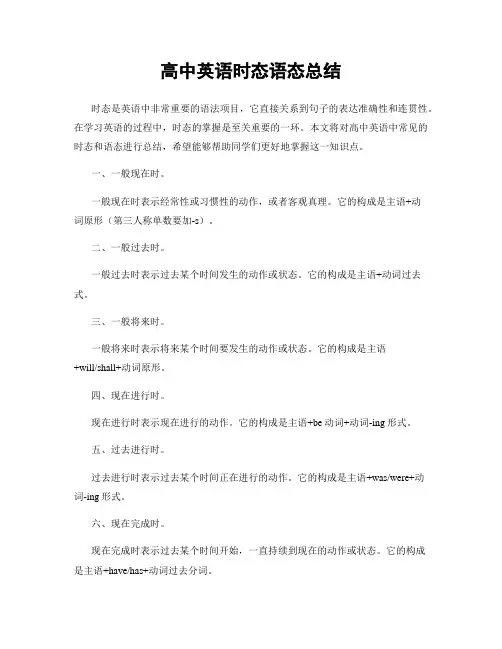
高中英语时态语态总结时态是英语中非常重要的语法项目,它直接关系到句子的表达准确性和连贯性。
在学习英语的过程中,时态的掌握是至关重要的一环。
本文将对高中英语中常见的时态和语态进行总结,希望能够帮助同学们更好地掌握这一知识点。
一、一般现在时。
一般现在时表示经常性或习惯性的动作,或者客观真理。
它的构成是主语+动词原形(第三人称单数要加-s)。
二、一般过去时。
一般过去时表示过去某个时间发生的动作或状态。
它的构成是主语+动词过去式。
三、一般将来时。
一般将来时表示将来某个时间要发生的动作或状态。
它的构成是主语+will/shall+动词原形。
四、现在进行时。
现在进行时表示现在进行的动作。
它的构成是主语+be动词+动词-ing形式。
五、过去进行时。
过去进行时表示过去某个时间正在进行的动作。
它的构成是主语+was/were+动词-ing形式。
六、现在完成时。
现在完成时表示过去某个时间开始,一直持续到现在的动作或状态。
它的构成是主语+have/has+动词过去分词。
七、过去完成时。
过去完成时表示过去某个时间之前已经完成的动作或状态。
它的构成是主语+had+动词过去分词。
八、一般将来完成时。
一般将来完成时表示将来某个时间之前已经完成的动作或状态。
它的构成是主语+will/shall+have+动词过去分词。
九、被动语态。
被动语态表示主语是动作的承受者。
它的构成是be动词+动词过去分词。
十、情态动词。
情态动词包括can, could, may, might, must, shall, should, will, would等。
它们用来表示说话人的态度、情感或推测。
总结,时态和语态是英语语法中的重要内容,它们直接关系到句子的表达准确性。
在学习过程中,我们要多加练习,多加总结,才能够真正掌握好这一知识点。
希望本文的总结能够帮助大家更好地理解和掌握高中英语中的时态和语态。
高考英语时态语态总结
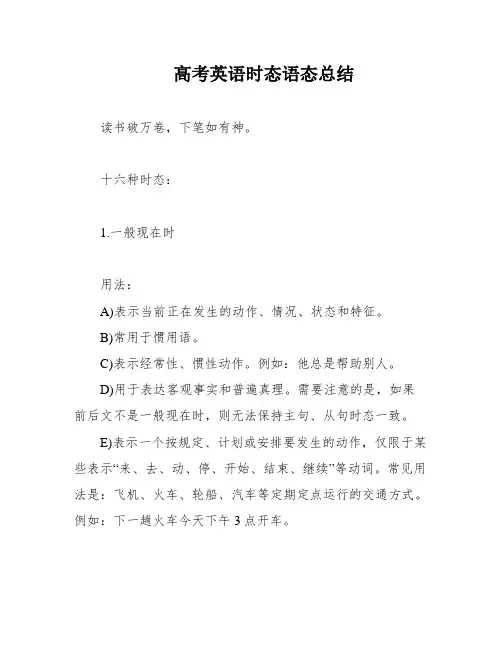
高考英语时态语态总结读书破万卷,下笔如有神。
十六种时态:1.一般现在时用法:A)表示当前正在发生的动作、情况、状态和特征。
B)常用于惯用语。
C)表示经常性、惯性动作。
例如:他总是帮助别人。
D)用于表达客观事实和普遍真理。
需要注意的是,如果前后文不是一般现在时,则无法保持主句、从句时态一致。
E)表示一个按规定、计划或安排要发生的动作,仅限于某些表示“来、去、动、停、开始、结束、继续”等动词。
常见用法是:飞机、火车、轮船、汽车等定期定点运行的交通方式。
例如:下一趟火车今天下午3点开车。
F)在时间和条件状语从句里经常用一般现在(有时也用现在完成时)表示将来事情。
例如:等你完成这份报告的时候,我就已经等了将近3个小时了。
2.现在进行时(be doing)用法:表示当前正在进行的动作。
3.现在完成时(have done)用法:A)表示动作到现在为止已经完成或刚刚完成。
例如:我买了一所新房子,但我还没有卖掉旧房子,所以现在我有两所房子。
B)表示从过去某时刻开始,持续到现在的动作或情况,并且有可能会继续延续下去。
此时经常用延续性动词。
时间状语常用since加一个过去的时间点,或for加一段时间,或by加一个现在时间。
例如:伟大的XXX虽然已经逝世,但他的很多思想至今仍在被当代科学家修改。
Although Newton was a great figure。
many of his XXX bythe work of modern XXX "challenge" is a transitive verb and should be in the passive voice in this sentence。
The n continues to the present day。
so the present perfect tense should be used。
Therefore。
the correct answer is C) "have been challenged"。
高考英语时态语态知识点
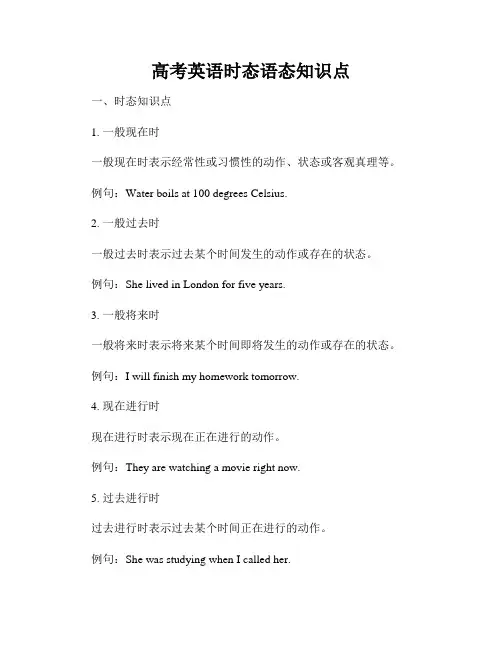
高考英语时态语态知识点一、时态知识点1. 一般现在时一般现在时表示经常性或习惯性的动作、状态或客观真理等。
例句:Water boils at 100 degrees Celsius.2. 一般过去时一般过去时表示过去某个时间发生的动作或存在的状态。
例句:She lived in London for five years.3. 一般将来时一般将来时表示将来某个时间即将发生的动作或存在的状态。
例句:I will finish my homework tomorrow.4. 现在进行时现在进行时表示现在正在进行的动作。
例句:They are watching a movie right now.5. 过去进行时过去进行时表示过去某个时间正在进行的动作。
例句:She was studying when I called her.6. 将来进行时将来进行时表示将来某个时间正在进行的动作。
例句:This time next week, we will be traveling in Japan.7. 现在完成时现在完成时表示过去某个时间发生的动作对现在造成的影响或结果。
例句:I have finished my homework.8. 过去完成时过去完成时表示过去某个时间或动作之前已经发生的动作或存在的状态。
例句:She had already left when I arrived.9. 将来完成时将来完成时表示将来某个时间之前已经完成的动作或存在的状态。
例句:By this time tomorrow, I will have finished my report.二、语态知识点1. 主动语态主动语态表示主语是动作的执行者。
例句:She wrote a letter.2. 被动语态被动语态表示主语是动作的承受者,强调动作对主语的影响。
例句:The letter was written by her.3. 进行时的被动语态进行时的被动语态表示主语正在被动地进行某个动作。
高考英语语法之时态和语态

高考英语重点语法1 概念1.表示不受时限的客观存在eg: I am a teacher. You are a student. She is a doctor.2.表示现在习惯动作eg: Peter often goes to his office by subway.Mary usually learns languages quickly.频度副词:usually, always , ever , frequently , hardly ever, never, occasionally, often, rarely, seldom, sometimes, etc.2 肯定句&否定句:(1)主语+be(am/is/are)+ 其他(表语)tips:第一人称用am,第二人称和第三人称复数用are,第三人称单数用is否定表达:主语+be not (am not/is not=isn’t/are not=aren’t) +其他(表语)例句见上(2)主语+实义动词+其他(宾语)tips: 第一,二人称以及第三人称复数用V原形,第三人称复数用v-seg:I often go to school by bus. -- I don’t often go to school by bus.Parents always praise their kids. -- Parents don’t always praise their kids.He wears the school uniform. --He doesn’t wear the school uniform.否定表达:主语(第一,二人称以及第三人称复数)+ don’t+ v-原形+其他(宾语)主语第三人称复数+ doesn’t + v-原形+其他(宾语)3 被动语态主语(动作的接受者)+ am/is/are + done + (by + 动作的实施者)tips:第一人称用am,第二人称和第三人称复数用are,第三人称单数用iseg; I am asked to study hard.The kids are always praised by their parents.The classroom is cleaned by us.(二)一般过去时1.概念(1)表示过去时间特定过去时间内一次完成的动作或一度存在的状态eg: This town was a tourist attraction before.We visited a factory last Friday.(2)表示过去习惯动作eg: He worked in a bank all his life.(3)表示过去的时间词:last …./….ago/before...具体时间:in 1990,yesterday2 肯定句&否定句:(1)主语+be(was/were)+ 其他(表语)tips:第一人称和第三人称单数用was,第二人称和第三人称复数用were否定表达:主语+be not (was not=wasn’t/were not=weren’t) +其他(表语)eg:This town wa sn’t a tourist attraction before.You weren’t a junior high school student two years ago.(2)主语(所有人称)+实义动词的过去式did+其他(宾语)否定表达:主语(所有人称)+ didn’t + v-原形+其他(宾语)eg: We didn’t visit a factory last Friday.He didn’t work in a bank all his life.3 被动语态主语(动作的接受者)+ was/were + done + (by + 动作的实施者)tips:第一人称和第三人称单数用was,第二人称和第三人称复数用wereeg:I was shocked by the news.The kite was made by Peter.Many houses were washed away in the flood.(三)现在完成时1 概念(1).过去发生的事情(已完成)对现在有影响eg: He has turned off the light.2.过去发生的事情(未完成)持续到现在,可能持续下去,也有可能刚刚结束eg: He has lived here since 2000.(可能继续住着,也可能刚刚搬走)2 肯定句和否定句肯定表达:主语+have/has done+ 宾语+其他否定表达:主语+have not(haven’t)/has not (hasn’t) done+宾语+其他tips: 第一人称,第二人称和第三人称复数用have/haven’t,第三人称单数用has/hasn’t eg:He has studies in England for two years.3 常用时间标志词a. for+一段时间b. since+时间点或从句3.连接ever , already, yet, so far , in the past/ last …. etc.eg: I have ever gone to Tibet.He has already finished the homework.I haven’t finished my paper yet.He has returned five gold medals so far.4.It is the first time that-从句It is the first time that I have watched the movie.4 被动语态主语(动作的接受者)+ have/has been + done + (by + 动作的实施者)eg: Amateurs have made important discoveries in astronomy.Important discoveries in astronomy have been made by amateurs.。
高中英语 动词时态和语态
4. 现在进行时 【例】 We are waiting for you now. 我们正在等你。 【例】 He is teaching in a middle school. 他在一所中学教书。 【例】 I'm meeting my father at the station at 5 o'clock. 我五点要去车站接我的父亲。 (1)现在进行时的构成 现在进行时的构成形式为:am/is/are+v.-ing。v.-ing形式的变化规则如下:
ONE If you don't hurry, you will miss the train. 如果你不快点儿,你就会
赶不上火车。 表示事物的固有属性或必然趋势; Fish will die without water. 离开水,鱼就会死。 表示偶然的、临 时的决定。 -Do you know Mr. Smith has come to our town? -No.
Mrs. Peter went to the park to have a walk every day last year. 彼得太太去年每天都到公园去散步。
I went to the cinema once a week when I was at school. 我上学时每周去看一场电影。
ONE ③表示过去连续发生的动作。这种情况下,往往没有表示过去的时间
walk. 她早早起床、提水,打扫房间,然后出去散步。
④在表示时间、条件等的状语从句中代替过去将来时。
They said they would let me know as soon as they got there. 他们说只要他们一到那儿就会马上通知我。
高中英语知识点归纳时态和语态的综合运用
高中英语知识点归纳时态和语态的综合运用英语中的时态和语态是语法知识中非常重要的一部分。
掌握好时态和语态的综合运用,能够帮助我们更准确地表达自己的意思。
下面将对高中英语中时态和语态的知识点进行综合归纳和运用。
一、时态的综合运用1. 一般现在时一般现在时主要用来表达现在的状态、经常性的动作或者客观真理。
结构为:主语 + 动词原形。
例如:- He often goes to school by bus.(他经常坐公交车上学。
)- Water boils at 100 degrees Celsius.(水在100摄氏度时沸腾。
)2. 一般过去时一般过去时主要用来表达过去发生的动作或存在的状态。
结构为:主语 + 动词的过去式。
例如:- They visited their grandparents last weekend.(上个周末他们去拜访了他们的祖父母。
)- She lived in Paris for two years.(她在巴黎住了两年。
)3. 一般将来时一般将来时主要用来表达将来要发生的动作或存在的状态。
结构为:主语 + will + 动词原形。
例如:- I will go shopping with my friends tomorrow.(明天我将和我的朋友去购物。
)- He will finish his homework before dinner.(他会在晚饭前完成他的作业。
)4. 现在进行时现在进行时主要用来表示现在正在进行的动作。
结构为:主语 +am/is/are + 动词的现在分词。
例如:- They are studying in the library now.(他们现在正在图书馆学习。
)- We are eating dinner at the moment.(我们此刻正在吃晚饭。
)5. 过去进行时过去进行时主要用来表示过去某个时间点正在进行的动作。
结构为:主语 + was/were + 动词的现在分词。
高考英语动词的时态和语态语法知识点与技巧方法
高考英语动词的时态和语态语法知识点与技巧方法一般现在时一般过去时一般将来时过去将来时现在进行时主动do/doesdidwill/shall dowould/shoulddoam/is/are doing被动am/is/are donewas/were donewill/shall be donewould/should be doneam/is/are being done过去进行时将来进行时现在完成时现在完成进行时过去完成时主动was/were doingwill/shall be doinghave/has donehave/has been doinghad done被动was/were being done----------have/has been done----------had been done一、一般现在时1、表示经常发生的习惯性的、现在反复出现的动作或状态,常用的时间状语有:always,usually,seldom, sometimes, every day, now and then, once a week等。
2、表示眼下或目前等现在时间所发生的动作或存在的状态,这种状态带有一定的持续性。
3、表示客观事实或普遍真理。
4、书报的标题,故事的叙述,小说、戏剧、电影等情节介绍,图片的说明等。
5、时间表、时刻表、日程表、节目单、课程表等按规定将要发生的动作,只限于go, arrive, leave, start, stay, return, begin, e等动词。
6、在时间、条件、方式、让步状语从句中,表示将来的动作。
注意:一般现在时可以用于定语从句或宾语从句中表示将来。
7、用在某些表达中,表示现在正在发生的动作或存在的状态。
Here es the bus!How it rains!二、一般过去时1、表示在过去某一时间点发生的动作或所处的状态,与现在没有关系。
常用的时间状语有:yesterday, last night, at that time等。
高三英语 时态和语态复习 (共53张PPT)
2)表示在过去一段时间内,经常性或习惯性的动作。 When I was a child, I often played football in the street.
现在完成时
构成: have (has) +过去分词。
现在完成时常与一些时间状语连用, 如: already; yet; just; before; recently ; lately ;等。
1)表示动作发生在过去,但对现在有影响。如:
I have just come back from America.
The leaves are turning red. It's getting warmer and warmer.
c. 与always, constantly, forever 等词连用,表示反 复发生的动作或持续存在的状态,往往带有说话人 的主观色彩。
You are always changing your mind.
用于现在完成时的句型 1)It is the first / second time….the only--- that…结构中的
从句部分,用现在完成时。 It is the first time that I have visited the city. It is the only detective novel that I have ever read. 2)This is the… that…结构,that 从句要用现在完成时. This is the best film that I've (ever) seen. 这是我看过的最好的电影。
- 1、下载文档前请自行甄别文档内容的完整性,平台不提供额外的编辑、内容补充、找答案等附加服务。
- 2、"仅部分预览"的文档,不可在线预览部分如存在完整性等问题,可反馈申请退款(可完整预览的文档不适用该条件!)。
- 3、如文档侵犯您的权益,请联系客服反馈,我们会尽快为您处理(人工客服工作时间:9:00-18:30)。
李林中学远程中心英语总复习专题:时态(下)题一.1. Hundreds of jobs ______ if the factory closes.A. loseB. will be lostC. are lostD. will lose2. I’ve won a holiday for two days to Florida. I ______ my mum.A. am takingB. have takenC. takeD. will have taken3. A new cinema ______ here. They hope to finish it next month.A. will be builtB. is builtC. has been builtD. is being built4. Selecting a mobile phone for personal use is no easy task because technology ____ so rapidly.A. is changingB. has changedC. will have changedD. will change5. I _____ Ping –pong quite well, but I haven’t had time to play since the new year.A. playedB. will playC. have playedD. play题二.1. — How are the team playing ?— They are playing well, but one of them _____ hurt.A. gotB. getsC. areD. were2. —You haven’t said a word about my new coua, Brenda. Do you like it ?—I’m sorry, I _____ anything about it sooner. I certainly think it’s pretty on you.A. wasn’t sayingB. don’t sayC. won’t sayD. didn’t say3. I wonder why Jenny ____ us recently. We should have heard from her by now.A. hasn’t writtenB. doesn’t writeC. won’t writeD. hadn’t written题三.1. With the rapid growth of population, the city _____ in all directions in the past five years.A. spreadsB. has spreadC. spreadD. had spread2. The silence of the library _____ only by the sound of pages being turned over.A. has been brokenB. breaksC. brokeD. was broken3. All morning as she waited for the medical report from the doctor, her nervousness _____.A. has grownB. is growingC. grewD. had grown题四.1. The news came as no surprise to me. I _____ for some time that the factory was going to shut down.A. had knownB. knewC. have knownD. know2. I thought Jim would say something about his school report, but he ______ it.A. doesn’t mentionB. hadn’t mentionedC. didn’t mentionD. hasn’t mentioned3. No one in the department but Tom and I _____ that the director is going to resign.A. knowsB. knowC. have knownD. am to know题五.1. I arrived late; I _____ the road to be so iey.A. wouldn’t expectB. haven’t expectedC. hadn’t expectedD. wasn’t expecting2. I ______ while reading the English textbook. Luckily, my roommate woke me up in time !A. had fallen asleepB. have fallen asleepC. fell asleepD. fall asleep3. Let’s keep to the point or we ______ any decisions.A. will never reachB. have never reachedC. never reachD. never reached题六.1. The mayor of Beijing says that all construction work for the Beijing Olympics _____ by 2006.A. has been completedB. has completedC. will have been completedD. will have completed2. The teacher, with 6 girls and 8 boys of her class, ______ visiting a museum when the earthquake struck.A. wasB. wereC. had beenD. would be3. — What were you doing when Tony phoned you ?— I had just finished my work and _____ to take a shower.A. had startedB. startedC. have startedD. was starting题七.1. — Has Sam finished his homework today ?— I have no idea. He ______ it this morning.A. didB. has doneC. was doingD. had done2. I _____ you not to move my dictionary –now I can’t find it.A. askedB. askC. was askingD. had asked3. According to the art dealer, the painting ______ to go for at least a million dollars.A. is expectedB. expectsC. expectedD. is expecting题八.1. the hero’s story _____ differently in the newspapers.A. was reportedB. was reportingC. reportsD. reported2. The coffee is wonderful ! It doesn’t taste like anything I _____ before.A. was havingB. haveC. have ever hadD. had ever had题九.1. — I say, Harry, What did you say to the laid –off worker just now ?— Nothing, I ______ to myself.A. had only talkedB. am only talkingC. have just talkedD. was just talking题十.— Have you seen Michael recently ?— Yes, in fact I saw him this morning. I ____ him for two years.A. haven’t seenB. hadn’t seenC. didn’t seeD. don’t see题十一.— Well, that was really a good meal. I _____ you were a really good cook.— Thank you.A. didn’t knowB. don’t knowC. haven’t knownD. hadn’t known题十二.— It is around 100 years, known to us all, ______ the first modern Olympic Games was held. — It really is. But were _____ ?A. that; was thatB. since; was itC. after; is thatD. when; is it题十三.let’s go out now. It _____ any more.A. didn’t rainB. doesn’t rainC. won’t rainD. isn’t raining题十四.—I’m sorry, I thought the remark would amuse you.— It _____.A. wouldn’tB. won’tC. doesn’tD. hadn’t题十五.Since you weren’t at the meeting, we _____ the decision without you.A. madeB. had madeC. were makingD. would made题十六.About 170 people _____ and dozens more _____ after a flood hit an Indonesian town last week.A. were killed; are still missingB. have been killed; were still missingC. are killed; are still missingD. had been killed; were still missing题十七.I ______ with my uncle and aunt because my parents have gone abroad for a holiday.A. stayedB. am stayingC. have stayedD. was staying题十八.I _____ a novel written by Ernest Heming –ways last night, and another night I’ll finish it.A. readB. have readC. had readD. was reading题十九.— Hurry up ! Alice and Sue are waiting for you at the school gate.— Oh ! I thought they _____ without me.A. wentB. are goingC. have goneD. had gone题二十— Are you still busy ?—Yes, I ______ my work, and it won’t take long.A. just finishB. am just finishingC. have just finishedD. am just going to finish题二十一.They _____ on the program for almost one week before I joined them, and now we _____ itas no good results have come out so far.A. had been working; are still workingB. had worked; were still workingC. have been working; have workedD. have worked; are still working题二十二.Nowadays, a large number of women, especially those from the countryside ______ in the clothing industry.A. is workingB. worksC. workD. worked题二十三.Months ago we sailed ten thousand miles across this open sea, which ______ the Pacific, and we met no storms.A. was calledB. is calledC. had been calledD. has been called时态(上)题一:1--5 A DBC D题二:DDC题三:BDB题四:BDB题五:C A C题六:ABB 题七:DDD题八:BA题九:C题十:C题十一:A题十二:D 题十三:A题十四:A题十五:A 题十六:D题十七:B题十八:B题十九:B题二十:C 题二十一:B题二十二:B题二十三:C时态(下)题一.:1B 2A 3D 4A 5 D题二.:1A 2D 3A题三.:1B 2D 3C题四.:1A 2C 3A题五:1C 2C 3A题六:1C 2A 3D题七.:1C 2A 3A题八:1A 2C题九.:D题十.:B题十一.:A 题十二.:B题十三:D 题十四:C题十五.:A题十六. A题十七. B题十八.:D题十九.:D题二十.:B题二十一.:A题二十二.:C题二十三.:B。
